Stock futures were in a holding pattern Tuesday evening as traders awaited results of the Georgia Senate runoff elections, which will determine control of Congress and shape policy decisions for the coming years.
Contracts on each of the major indices were little changed as the overnight session kicked off. During the regular session, the three major indices pushed higher to shake off Monday’s declines, as energy and tech stocks gained. U.S. crude oil prices jumped above $50 per barrel for the first time since February 2020 after Saudi Arabia unexpectedly agreed to cut oil output by one million barrels per day to support languishing energy prices during the pandemic.
Political uncertainty has gripped U.S. equities over the past several sessions, with the Georgia Senate run-off elections a central event. Polls in Georgia close at 7 p.m. ET on Tuesday, though many political analysts have warned it may take some time to tabulate the votes amid this year’s surge in mail-in and early ballots. A record more than 3 million individuals voted early or by mail for the Georgia run-off elections, according to the U.S. Elections Project.
“Similar to the general elections in November, in-person ballots will likely be tabulated first with mail-in ballots taking somewhat longer to count in full,” Nomura economist Lewis Alexander said in a note Tuesday. “Given the disproportionate use of voting by mail for Democrats, that means the early results could skew Republican (widely referred to as a ‘red mirage’).”
Strategists have largely taken hold of the notion that a Democratic sweep of both seats in Georgia would be a market negative event due to the implications for higher corporate taxes and bigger government spending. The S&P 500 could see a downdraft of as much as 10%, according to one prediction from Oppenheimer.
“The lights … may be dimmed a little bit on the market run we’ve been having depending on what the outcome is. I think from our perspective, if you do see Democrats win both of those seats with a 50-50, very slim majority in the Senate, we could see some action that could results in a tax increase really in late 2021 or 2022,” Chris Meekins, healthcare policy analyst Raymond James, told Yahoo Finance. “But in the near-term, you’re more likely to get fiscal stimulus, you’re more likely to see some potential nominations get through that may be more progressive. So it’s a bit of a mixed bag. I think it will take some time for the market to interpret what can get done versus what won’t be able to get done.”
Others also suggested markets’ fears over the outcome of the election may be overblown.
“Even if the Democrats win two seats, which would give them the Senate in a 50-50 tie, there are a couple of Democrats who are quite moderate — you’ve got Joe Manchin of West Virginia, you’ve got Jon Tester of Montana,” Greg Valliere, AGF chief U.S. policy strategist, told Yahoo Finance on Tuesday. “Those two moderate Democrats I think will not going along with everything the Democrats want if they control the Senate. So no matter how you slice it, I think you’re looking at a pretty centrist environment for the financial market.”
—
6:02 p.m. ET Tuesday: Stock futures open flat
Here were the main moves in markets, as of 6:02 p.m. ET Tuesday:
S&P 500 futures (ES=F): 3,715.5, down 2.75 points or 0.07%
Dow futures (YM=F): 30,265.00, down 20 points or 0.07%
Nasdaq futures (NQ=F): 12,794.5, up 1 point or 0.01%
—
Follow Yahoo Finance on Twitter, Facebook, Instagram, Flipboard, LinkedIn, and reddit.
Find live stock market quotes and the latest business and finance news
For tutorials and information on investing and trading stocks, check out Cashay
Source: Read Full Article
